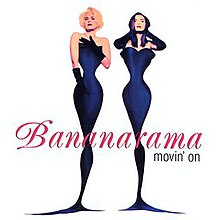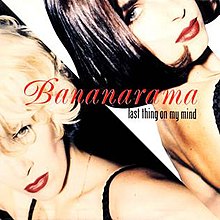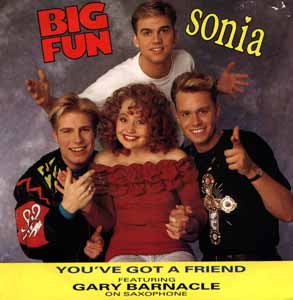As far as inspirations on the oeuvre of SAW goes, it's clear that there were various touchpoints which influenced Mike, Matt and Pete.
Certainly Mike Stock has cited Stevie Wonder and Billy Joel amongst others, whilst Matt Aitken has professed a love of Led Zeppelin. And there is surely a shared admiration of The Beatles amongst all three.
However, a line can be traced right back to the Swedish group ABBA. Whilst Stock and Aitken have not explicitly referred to ABBA as a direct influence, Waterman has repeatedly discussed his love of the band and there is something of the band's expertise in melody and arrangement in many SAW records.
And this has perhaps never been more overt than in the two ABBA-esque singles Mike Stock and Pete Waterman wrote and produced for Bananarama.
Bananarama and Stock Aitken Waterman had enjoyed a successful partnership between 1986 and 1989, starting off with the hi-NRG cover of Shocking Blue's 1970 hit Venus and culminating in the cover of The Beatles' 1964 hit Help! for Comic Relief. During this time, founding member Siobhan Fahey had departed the group and was replaced by Jacquie O'Sullivan, and the band returned to start work with SAW on new material. However, the band were disappointed with the initial results -- as well as apparently being concerned that the sound they had developed with SAW was being applied to many different artists (an accusation also levied at SAW by Dead Or Alive). As a result, Bananarama withdrew from working with SAW and commenced work on a new album instead with producer Youth (formerly of SAW-produced band Brilliant).
The resulting album Pop Life -- which actually did carry two SAW tracks (Ain't No Cure & Heartless) from the aborted 1989 sessions -- was a critical success in 1990, but after initial success thanks to two high-charting singles, the campaign petered out, with final single Tripping On Your Love peaking outside the Top 40. O'Sullivan departed the band shortly after for personal reasons.
Bananarama carried on as a duo -- Sara Dallin and Keren Woodward -- and in 1991, started planning their follow-up album. Their record label London Records urged them to work again with Mike Stock and Pete Waterman; the production trio, like Bananarama, had also slimmed down in the wake of Matt Aitken's departure in 1991.
When one considers the negative comments Bananarama had made about their reasons from moving away from SAW, their reunion with Stock & Waterman may have been a surprise -- but it wasn't a shock move. The music scene had changed dramatically by 1991/1992 and, looking back, it's difficult to see what direction Bananarama should have taken in a music scene dominated by techno and indie. Perhaps London Records were at a loss as where to take Bananarama, and decided to bring Stock & Waterman in as a safe pair of hands.
The resulting album -- Please Yourself -- apparently had a long gestation period, with the majority of tracks going through various mixes to please London Records. As a result, the album does not have a cohesive feel but instead tackles different genres; this is no bad thing as it is a strong album but it does not always sound like a Bananarama album. The overriding theme is 70s disco, with tracks like Give It All Up For Love, Is She Good To You? and Only Time Will Tell. You're Never Satisfied is perhaps the most typical S(A)W sounding track, whilst You'll Never Know What It Means draws on house and techno sounds to create a very contemporary sound. Closing ballad I Could Be Persuaded taps into US soul, with breathy vocals, male backing vocals as well as an elongated intro and coda, which shows off the excellent instrumentation and playing.
Waterman has since referred to the project as "Abba Banana", commenting that it was an attempt to tap into the Abba sound -- which of course was enjoying a revival thanks to the release of the success of Erasure's Abba-esque EP and the ABBA Gold compilation. However, this is not strictly accurate and I would argue that any nod towards ABBA is restricted to two tracks -- both released as singles: Movin' On and Last Thing On My Mind.
Movin' On was the first single from the album, and indeed relaunched Bananarama as a duo in 1992. The Benny and Bjorn influence is clear from the get go, with a terrific piano riff that tips its hat to Dancing Queen, leading to a verse, bridge and chorus melody that could have been written by the Swedes themselves. Interestingly though, the original mix (eventually released on the aforementioned re-issue) lacks the ABBA elements; it actually has its roots in a 70s disco sound in line with the overriding sound of the album. It would appear, from PWL archivist and expert Tom Parker's excellent sleevenotes for the 2013 Edsel re-issue of Please Yourself, that Last Thing On My Mind was the final track recorded for the album and was styled upon ABBA from the get go -- but one wonders if the ABBA influence was introduced to Movin' On following the success of Erasure's Abba-esque EP two months prior to the release of Movin' On.
A co-write between Stock, Waterman, Dallin and Woodward, Movin' On deals lyrically with the break-up of a relationship and the protagonist's attempt to put the pain behind them. However, you could argue that a parallel could be drawn with Bananarama (and indeed Stock & Waterman!) dealing with the loss of their respective former members, and making a statement that they would carry on stronger than before.
The verses are typically melancholic -- "And now the sun has finally set / And this is where the story ends / We didn't count upon a rainy day" -- whilst the chorus reveals new-found optimism -- "But I had no way of knowing / And I don't know where I'm going / But I'm movin' on". The strong lyrics contribute to the powerful flow of the melody; the track has a real organic feel to it, with little reliance on tricksy key and chord changes (though there is nothing wrong with such tricks!). It sounds like an effortless piece of work, though undoubtedly lots of hard work and talent went into its creation.
The girls sound in good voice on this track; there's a really successful match between their vocal delivery and the musical arrangement on this track. The upbeat backing supports their voices, and strengthens their impact. A note too for the backing vocals; most SAW Bananarama tracks had the girls themselves on backing vocals, but here, Stock & Waterman deploy the male backing vocalists they had introduced in 1991 for Kylie Minogue's Word Is Out. Whilst it detracts from an attempt to replicate the ABBA sound, it does adds to the contemporary sound at play here.
And that's a point worth making; whilst the ABBA influence is clear to see, Stock & Waterman have taken that and fused it with their own sound. In the same way that Jason Donovan's I'm Doing Fine evokes the sound of The Beatles whilst not actually sounding like The Beatles, Movin' On projects the ABBA sound with some of the band's key stylistic and melodic touches, whilst combining them with the S&W touches of a robust rhythm track, warm synth pads and prominent backing vocals.
However, whilst Stock & Waterman were indeed experimenting with different styles in 1992, the arrangement was still based around their signature sound enough for it to lack the modernity of the hit records of the time. Perhaps this was why Movin' On peaked at #24; a respectable position but perhaps a disappointing one for London Records. Given the "quality" of its contemporaneous rival singles, Movin' On'certainly was worthy of a higher position.
The single did receive fair promotion, although Dallin and Woodward were left exposed when the backing track tape jammed during a Radio 1 Roadshow performance to launch the single. Alan Jones wrote in Music Week that "Bananarama return with an impossibly commercial reminder of their former glories. Movin' On they ain't, but hitbound they most certainly are".
Released in August 1992, Movin' On was officially issued with a number of mixes; the 7" mix and the slightly extended Straight No Chaser mix (with a different coda than that of the 7" mix) both by Dave Ford, as well as harder, clubbier mixes -- the Bumpin' Mix courtesy of DJ CJ Mackintosh, and the Spag-A-Nana Dub by Tony Humphries. A further mix was issued on promo, the Bumpin' Mix, from PWL staffers Gordon Dennis and Peter Day.
It should be noted that there were numerous in-house mixes of the track which remained unreleased until the Please Yourself re-issue; the original 12" mix, the NRG Mix, the Movin' Mix, the NRG Mix and the Norty Banana Mix. Whilst one can understand why London Records -- and especially Bananarama's A&R man, DJ Pete Tong -- would want to get the track into the clubs, it is a shame that they opted to withhold the PWL mixes in favour of trendy mixes which did not treat the material sympathetically.
Of the PWL mixes, it's worth checking out the Bumpin' Mix and especially the Original 12" Mix, which has a raw disco appeal that is quite at odds with the polished Abba-esque single mix. There was also a Spanish version -- entitled Nueva Direccion -- which features Bananarama singing the song in Spanish over the backing of the 7" mix, although the absence of any backing vocals renders this version a little sparse. The definitive version must be the Straight No Chaser, with its lovely extended instrumental sections which feature a lovely descending pattern, although special mention must also be made of the terrific 70's style guitar solo.
The next single, Last Thing On My Mind, followed in November 1992 -- and this took the Abba tribute to the next level. Tom Parker states that this track was the final track to be recorded for the album, and one wonders whether the Abba-fever sweeping the nation bore any influence on the direction of this track. As stated above, whereas Movin' On appears to have been adapted to sound like ABBA, Last Thing On My Mind definitely sounds like an ABBA tribute by design.
If anything, Last Thing On My Mind went deeper into ABBA territory, not just in melody but especially in production. Boasting a very intricate arrangement, the track features a plucked harp on its opening riff (a nod to I Have A Dream), arpeggio synth lines (reminiscent of Abba's 1981/1982 material) and some lovely guitar (channeling the work that ABBA session guitarist Janne Schafer did on the classic tracks). Building up the warm sound are strings, synth pads and real-sounding drum programming. Overall, it has the sound -- albeit modernised -- of a latter-day ABBA track, and could almost fit in somewhere between One Of Us and Under Attack.
Melodically, the dramatic verses give way to an almost sing-song bridge -- and then straight into a chorus worthy of Benny and Bjorn themselves. The phrasing is classic ABBA -- "And you're suddenly like a stranger / And you're leaving our love behind" -- but the following lines -- "Of all the things I was planning for / This was the last thing on my mind" -- nails it. You can imagine Agnetha and Anni-Frid singing that bit, no question.
However, the Bananarama version of Last Thing On My Mind gets a bit of a bad rep, with many people seeming to prefer the later (and more commercially successful) Steps version. If you check out a few pop music forums such as Popjustice, you will see numerous references to the track being "plodding" or "dull".
Now I LOVE the Bananarama version (and much prefer it to the Steps version)... but I do understand what people mean by such comments. I seem to recall that, at the time of release, I loved it but felt it could have benefited from a bit more "oomph" -- but I listen to it now and if anything, I appreciate the track more than ever... yet I cannot put my finger on why it has such a lukewarm reception from fans of S(A)W and Bananarama.
I mean, the instrumental is BEAUTIFUL. Seriously. It just sparkles. It was only released recently as part of the Bananarama In A Bunch CD singles box set, and I was amazed to hear so many parts & elements that were new to me -- even after 24 years of listening to it. The instrumental isn't available to listen to online in its entirety but you can hear a 2 minute extract at the Juno website.
So if there isn't a problem with the arrangement, what of the vocals? Now there are various views regarding Bananarama's vocal ability but they clearly can sing. For me, Bananarama sound better when their vocals are set against a dense, upbeat backing, as with I Heard A Rumour, I Can't Help It -- and even Movin' On. That juxtaposition works. However, in the case of Last Thing On My Mind, you have Bananarama set against a mid-tempo -- and intricate -- backing. And I'm not sure that this backing provides the boost that their vocals sometimes require. Perhaps it is this which results in any perceived "plodding"?
Certainly, many fans prefer the hi-NRG Mix which, as the title suggests, sets the girls against a backing of pounding synths and robust drum programming. Whilst this version is perhaps more typical of the S(A)W sound, it doesn't have the same allure of the main mix, with its lovingly, carefully crafted musicianship.
When it comes down to it though, I adore this track. The melody and arrangement are just gorgeous, and I do actually think that it's largely well performed by Bananarama, despite my comments above.
Alas, it appears that the record buying public of 1992 did not share my enthusiasm, as Last Thing On My Mind could only reach #71 in the UK singles chart. As with Movin' On, it did receive decent promotion; it was certainly playlisted on BBC Radio 1, and I remember DJ Steve Wright making positive comments about it on his afternoon show for that station. Unfortunately, his admiration was not shared by Smash Hits, where Mark Frith ended his one-star review of the song with the following statement: "Now that Mike & Pete make so few records, you'd think that the ones they did make would be really ace, wouldn't you? You'd be wrong".
 |
| Mark Frith doesn't hold back on what he thinks of "Banarama"! |
As with Movin' On, there were further in-house PWL mixes that went unreleased until the Please Yourself re-issue, including an extended version (of the 7" mix) and an Xtra NRG mix. The extended version is definitely worth a listen, as is the aforementioned hi-NRG mix -- and especially the amazing instrumental version.
Clearly, the failure of Last Thing On My Mind to achieve a Top 40 chart placing was cause for concern for London Records, who opted to release a cover of Andrea True Connection's More More More (with additional lyrics by Stock & Waterman, and Bananarama). This track, remixed and buffed up from the album version, was more in line with the overall disco direction of the album, and did take Bananarama back into the Top 40, matching the #24 peak of Movin' On in March 1993. However, this contemporary update of a 70s disco classic ended the attempts at an ABBA-styled sound.
The Please Yourself album followed soon after in April 1993, and a fourth single -- the immediately catchy Is She Good For You? -- was earmarked for release in remixed (by Dave Ford) versions. However, the poor performance of the album led to the single release being aborted -- and ultimately to Bananarama parting ways with London Records, their label of 12 years.
Looking back on the exercise, the two ABBA-esque Bananarama tracks masterminded by Stock and Waterman point to a fascinating experiment that never reached full fruition. It seems that these tracks signified a late-in-the-day change in direction for a 70s disco-influenced album which was largely completed by that point -- and as the first two singles of the album campaign, were not fully representative of the Please Yourself album.
Whilst Please Yourself was perhaps less immediate than the power pop of the earlier SAW-produced album WOW!, it's a strong album with a pleasing take on disco and soul. But while You'll Never Knows What It Takes provided a tantalizing glimpse of a new Bananarama sound for 1993 (which frustratingly was never built upon), one does wonder what a full Bananarama album of S&W-helmed ABBA-infuenced tracks would have sounded like...
References:
Tom Parker -- Sleevenotes to the Edsel 2013 Deluxe Edition of Please Yourself
Alan Jones -- Market Preview, Music Week, August 1992
Mark Frith -- Singles Reviews, Smash Hits, November 1992
Follow @stephenobrien







:format(jpeg):mode_rgb()/discogs-images/R-692228-1191767981.jpeg.jpg)

:format(jpeg):mode_rgb():quality(96)/discogs-images/R-2729672-1419291313-3445.jpeg.jpg)
